Learning to See
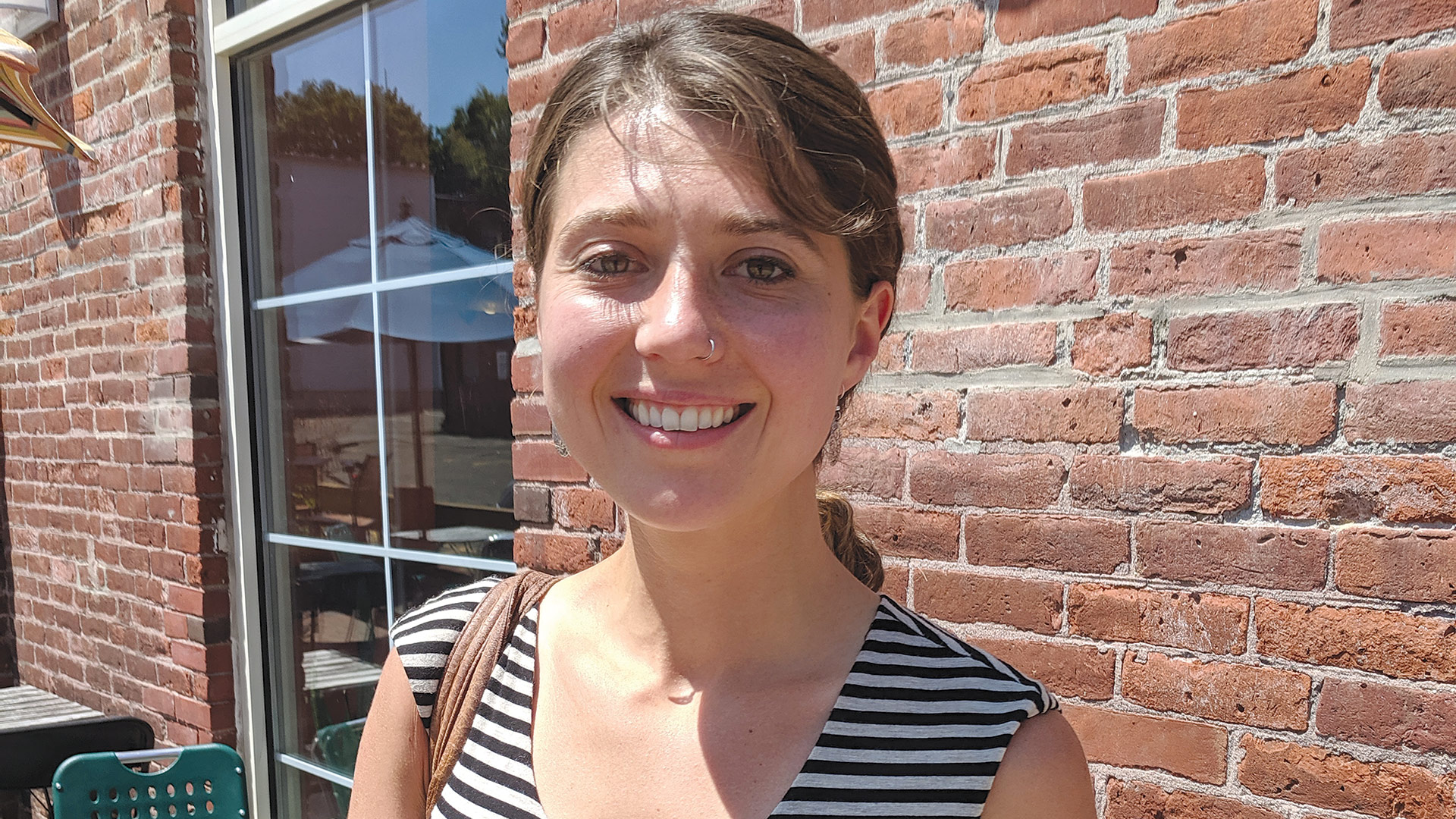
Joy Baglio
When she arrived in the Pioneer Valley from New York City four years ago, Joy Baglio knew she wanted to write, and to connect with other writers. What she didn’t expect was to stumble upon a passion to teach the craft of writing, and to assemble a team to help her do that. Since its opening in 2016, the Pioneer Valley Writers’ Workshop has grown steadily, into a place both supportive and rigorous. And that’s an intriguing story in itself.
Joy Baglio likes sharing a quote by Flannery O’Connor, who wrote, “learning to see is the basis for learning all the arts.”
And there are many ways to see, Baglio said, including breaking apart written texts to examine the ‘how’ of writing — the craft, to employ a term Baglio uses often to describe what takes place at Pioneer Valley Writers’ Workshop (PVWW).
“I guess I have an inner engineer, someone who wants to understand how things work — but with stories,” she said during a candid conversation with BusinessWest, a few weeks after she was honored by the magazine as one of this year’s 40 Under Forty.
The problem is that the process of learning how to improve one’s writing requires vulnerability — and not every writer relishes that.
“People want to be recognized, they think they want to improve, but they don’t know how to take feedback,” she said. “We all have sense that what we produce is precious and sacred. That’s an earlier writer impulse — ‘this came out this way, this needs to be in this format, I’m protective of the way it is.’”
However, “there’s a moment when you emerge from that, when you really want to grow,” she went on, before hearkening back to the O’Connor quote. “Learning to see is also learning to see where your own work can grow. What can you learn from others? How can you learn those things? Taking feedback is one of the big challenges. It’s hard — it challenges our sense of self.”
But those who attend classes and workshops at PVWW quickly learn the value of feedback, of diving honestly into their work, and of honing their craft — just as Baglio does with the trusted writers to whom she sends her own manuscripts.

Joy Baglio (right) with PVWW Assistant Director Kate Senecal at the Easthampton Book Fest.
“If there’s anything not working, I want to know all of it. I want this thing to be as good as it can be,” she said of perhaps the greatest reason to take a class. “It requires deep self-honesty. What do you really want from your writing? Are you writing for yourself, in which case feedback is very threatening? Is it all about the ego, or is there something about the process of writing that you love? Do you want to be recognized and that’s all, or do you want to be the best writer you can be? If so, it requires a kind of surrendering.”
Writers — both seasoned and just starting out — have been happily surrendering, and growing, at PVWW since Baglio launched the school in 2016 as an informal Meetup.com group. It has since expanded to 13 instructors and a comprehensive curriculum that draws fiction writers, memoir writers, poets, even songwriters. One-day classes offer participants the opportunity to focus on specific elements such as dialogue, setting, and suspense, while multi-week series delve deeper into fiction fundamentals, story arc, revision, and more.
The organization also provides one-on-one consultations and writing-coach services, as well as hosting free writer gatherings and readings designed to cultivate and support the writing community at large.
It’s a collaborative environment where the instructors — who receive most of the proceeds the class fees generate — have plenty of say in what they’d like to bring to the table.
“We just slowly built it so we had more and more people teaching, and in order to sustain it, we started charging for classes, as low as we could, and it just kind of grew from sheer demand of people being interested and telling us how valuable they found it.”
“I might say, ‘it would be great if we had a class on sentence structure, creating flow on sentence level,’ and someone might fill that gap. But I want them to be passionate about what they’re teaching. We send out calls for class proposals, and I try to offer as many as we can,” Baglio said. “We offered 20 classes last spring — so it’s really kind of grown. I had no idea that it would grow like this.”
Settling Down
Baglio’s own story begins in Buffalo, N.Y. — “I grew up in blizzards and lake-effect snow” — after which she earned her undergraduate degree in English and creative writing from Bard College in New York, followed by an MFA in fiction from the New School in Manhattan.
She remained in the city for several years after that, but she and her partner were looking for a lifestyle change when they moved to the Pioneer Valley in 2015.
“My own writing started taking off when I moved here,” she recalled. “There must be something about leaving a place like New York City and coming to a place like this, a new place.”
Some early successes with published work and awards — her short stories have appeared in Tin House, Iowa Review, New Ohio Review, TriQuarterly, PANK, SmokeLong Quarterly, and many others — gave her a sense of momentum and possibility in her new home. In particular, a short story in Tin House called “Ron” — about a young woman who encounters a long series of lovers by that name — led to a film and TV option, and a film agent. Meanwhile, she’s working on a novel based loosely on her short story “How to Survive on Land,” the story of three half-mermaid siblings.
Much of Baglio’s work falls into the genre known as speculative fiction, a broad umbrella that includes sci-fi, fantasy, dystopian or futuristic fiction, and other imaginative themes. She started writing fantasy in high school, but as an undergrad, she was encouraged to write in a more realistic bent, although it wasn’t interesting to her. Inspired by the stories of Karen Russell and others, she felt she could uncover more meaning through more interesting, fantastic angles — and have fun doing it.
“It feels more playful, and I’m an advocate that writing is not drudgery,” she said. “My impulse was always that kind of story, but I got steered away from it — and then I refound it.”
A lot of her ideas lend themselves to “short exploration,” she said, which explains why she has about 20 pieces of flash fiction — very short stories — on her desktop. “I jump around and try to inch them all forward simultaneously, like an advancing army of stories. I like to work from start to finish through a piece and get that practice of what it means to begin and end something and develop it.”
That said, she’s making progress on her novel — writing much of it in a notebook instead of on a computer, which forces her to move the story forward, rather than get bogged down tweaking one section. She was awarded fellowships from the Elizabeth George Foundation and the Speculative Literature Foundation for work and research on the novel, for which she has already received early interest from agents and publishers.
She also teaches at the Boston-based creative writing center GrubStreet, and is associate fiction editor of Bucknell University’s literary magazine, West Branch.
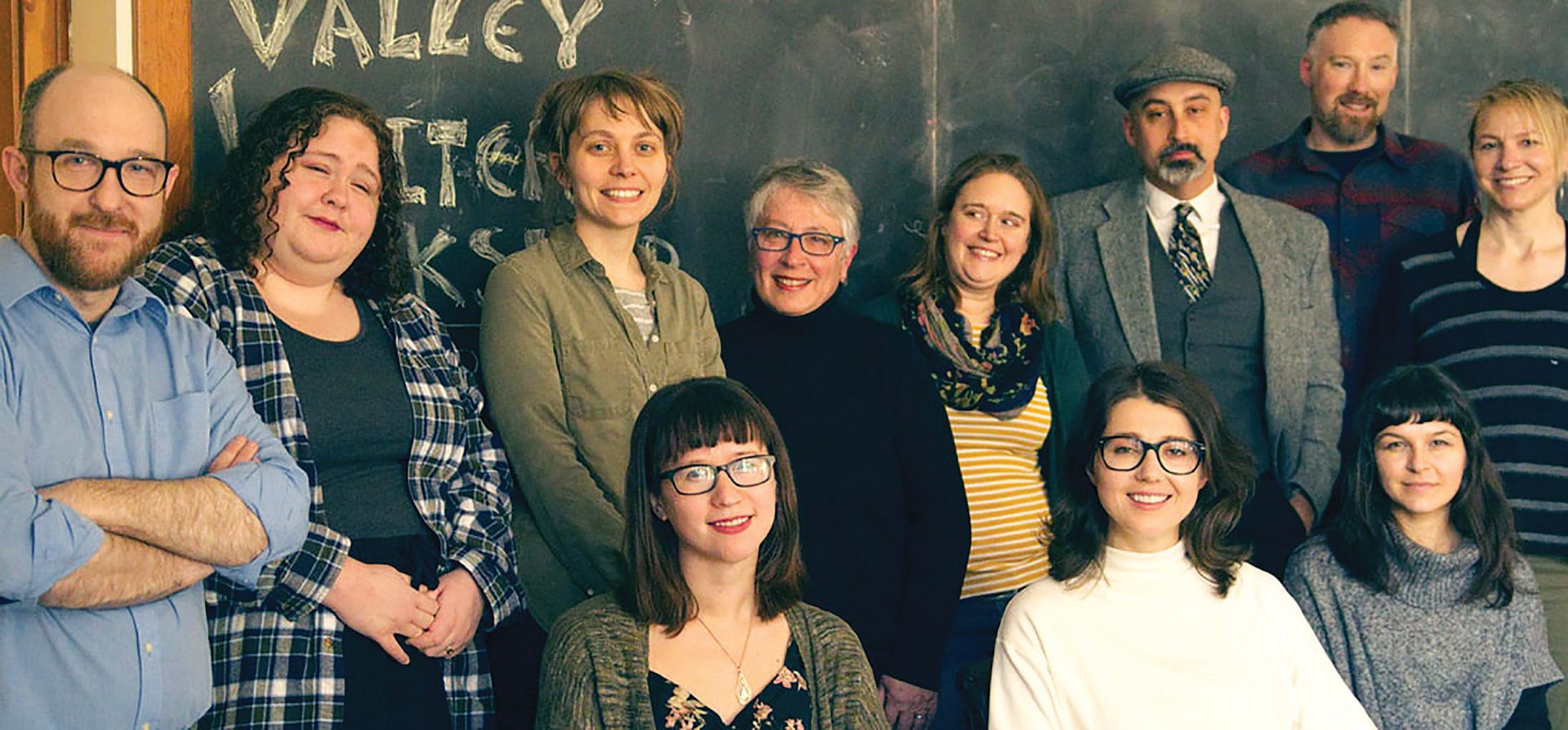
The school’s instructors bring a deep pool of writing and editing experience to their classes.
All that would seem to take a good deal of Baglio’s time, and it does. In fact, she never planned to start a writing school — just to move to an arts-friendly region with a writing community she could tap into. When she did, through the Meetup groups gathering at Commons Coworking in Williamsburg, she saw an opportunity for more.
“There are a lot of small writing groups around here, and I loved some of them. I just felt a need for something else — I felt people wanting and needing instruction and tools,” she said. “I refer to ‘the writer’s toolbox’ — all the techniques and tools and concrete stuff that can actually help people. Like point of view — it’s a very technical craft element, and when you understand point of view and narrative distance and how to move farther and closer to your characters, it can really improve your writing a lot.”
She was particularly inspired by writing conferences she attended after earning her MFA, especially Tin House’s summer workshop in Portland, Oregon, which was very craft-based in instruction.
“We learned about technical stuff that I feel wasn’t even taught in many of my MFA classes. It really approached writing from the point of view of how to technically learn different skills,” she said. So, once her Meetup sessions became well-attended, Baglio began to put the pieces together in an entrepreneurial way.
“Even at the beginning, I approached it as a class, so I had a whole lesson. I think the first-ever one I did was on creating and developing characters,” she said. “I was leading it; it wasn’t just a free-for-all meeting where we’d sit and write together. I was giving out a lot of craft instruction I had accumulated over years — a lot of stuff I thought was helpful. And people kept coming back.”
Preserving the Spark
The roster of classes and workshops gradually expanded as Baglio met more writers drawn to the experience — and more instructors as well.
“We just slowly built it so we had more and more people teaching, and in order to sustain it, we started charging for classes, as low as we could, and it just kind of grew from sheer demand of people being interested and telling us how valuable they found it,” she explained. “A lot of people told us this was the first of this kind of writing instruction in the Valley. There are a lot of literary offerings and writers, but there isn’t one cohesive craft school for writing. So I felt there was a need — and we kept expanding.”
Becoming an entrepreneur was an education in itself, she added, and in many ways, running the school has taken time away from actual writing, but, on balance, she feels energized by the interactions.
“With writing, it’s always a balance of preserving your own creative spark and your own initial drive that led you to write in the first place with the practical side of how to teach others,” she told BusinessWest. “I really love teaching. I feel like I learn so much from the students and from other writers. I feel like I have this community of writers in the Valley.
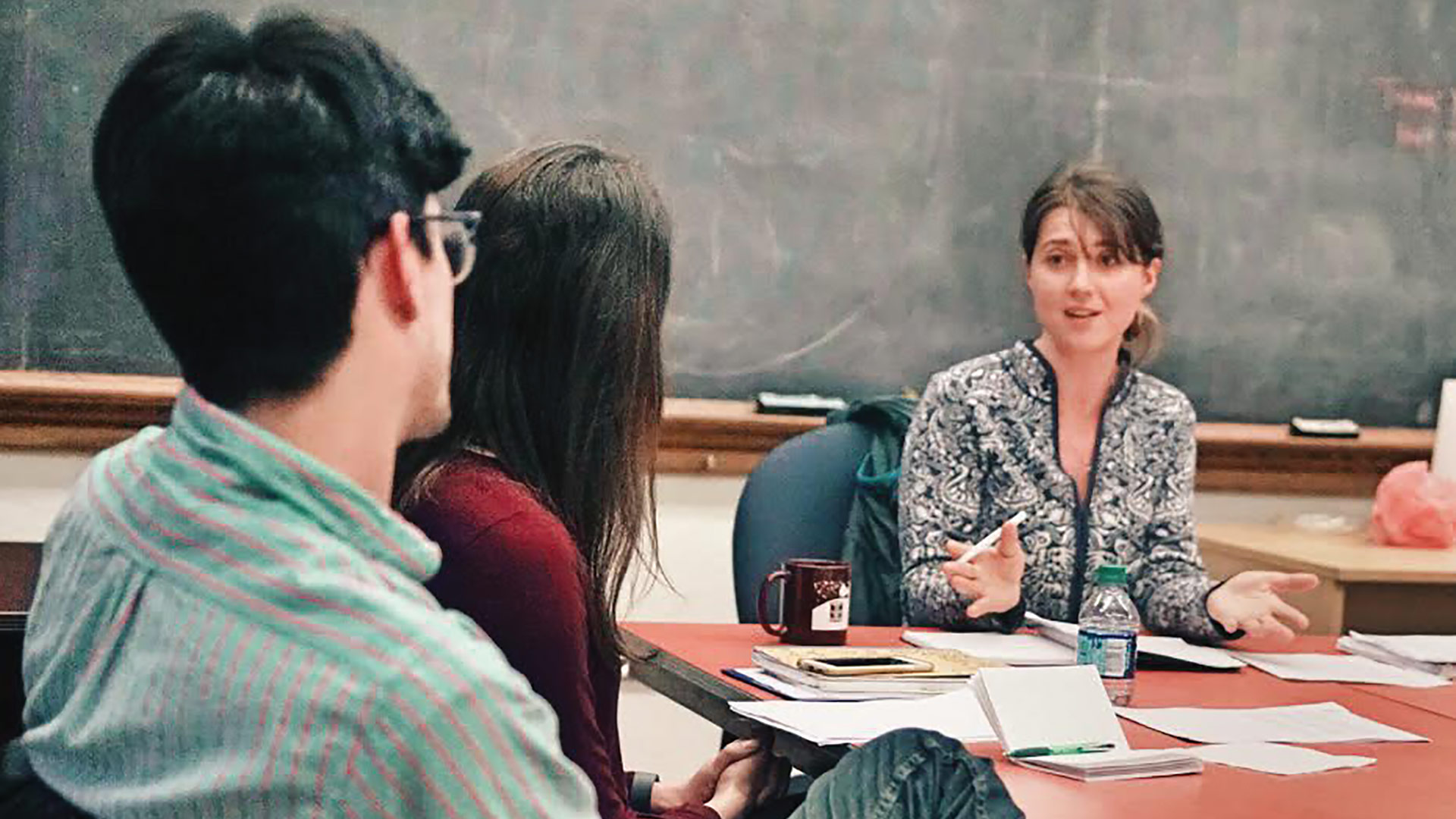
Joy Baglio is seen here teaching the first-ever multi-week workshop (Intro to Fiction) at Pioneer Valley Writers’ Workshop — the first, as it turns out, of many more.
“It’s become this weird marriage of my own passion and the practical aspects of the business,” she went on. “Administrative work takes a lot of time. But it does give me creative energy. I just see what the other instructors are teaching, and I’m inspired by their topics, what they propose.”
The school — which draws writers of all ages and skill levels, from young people just starting out to retirees contemplating their memoirs — remains based at Common Coworking, which has been a positive symbiotic relationship; a number of current members at the space discovered it through a writing class.
Baglio also hosts free monthly community writing sessions and organizes free public literary readings and author panels at venues such as UMass Amherst, local libraries and bookstores, and other central locations in the Pioneer Valley. The school’s curriculum also includes workshops specifically geared to young creative writers, from middle through high school. On a related note, Baglio is currently teaching speculative fiction writing to high-school girls at Smith College’s summer writing program.
While her next goal is to get her novel into the world — which she feels would raise the profile of the PVWW as well as her own — she’s also looking at ways to expand the school, including online options and perhaps a residency program.
“I want to find really innovative ways to help people feel empowered creatively,” she said. “I feel like Pioneer Valley Writers’ Workshop can go in many different directions, but craft is always at the center of it. I want it to feel both rigorous and kind.”
She’s found plenty of both rigor and kindness through her development of a school she never planned to open when she left the urban environs of New York City.
“I remember moving here and reading some article saying this is the most densely populated area of writers in the country. So it isn’t surprising that this would emerge here,” she said. “I wasn’t dreaming of starting a writing school in New York, but I needed to get out of the city to do this. I feel like the Valley itself inspired this.”
Joseph Bednar can be reached at [email protected]



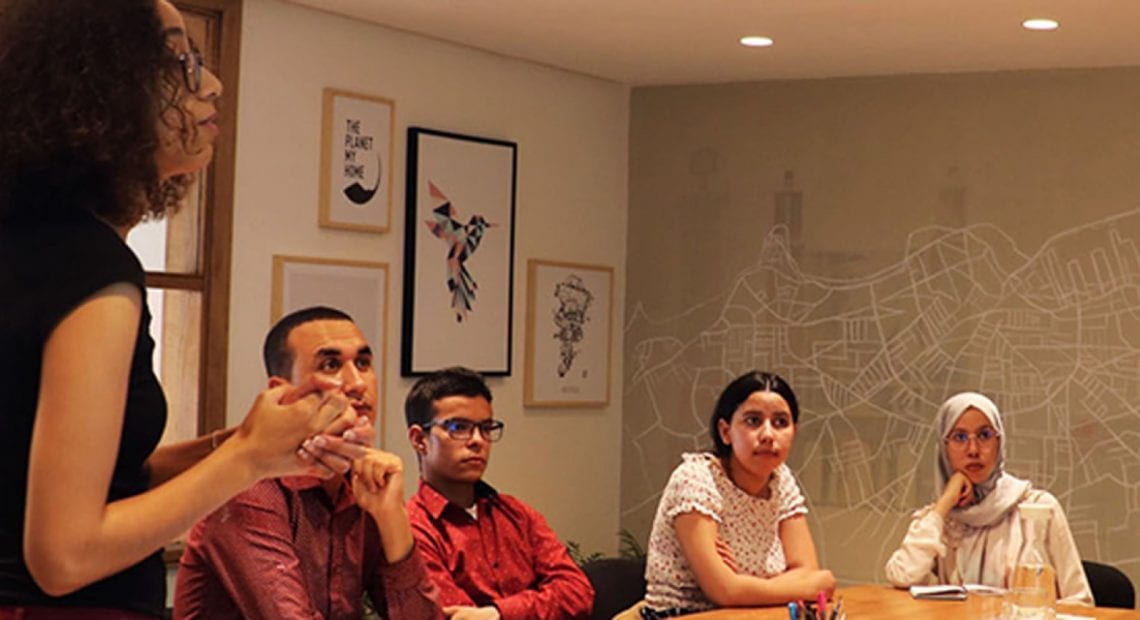

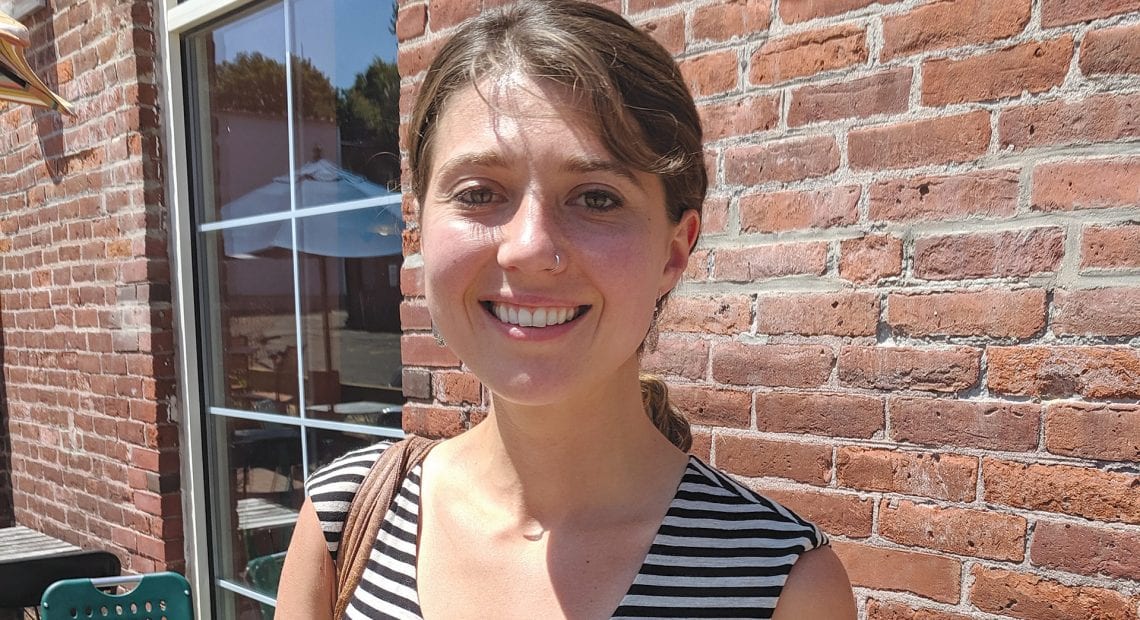





 JD, LLM, CLU, ChFC, AIF, CDFA
JD, LLM, CLU, ChFC, AIF, CDFA


